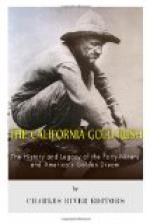But the terrible part of the journey began with the entrance into the great deserts, like that of the Humboldt Sink. There the conditions were almost beyond belief. Thousands were left behind, fighting starvation, disease, and the loss of cattle. Women who had lost their husbands from the deadly cholera went staggering on without food or water, leading their children. The trail was literally lined with dead animals. Often in the middle of the desert could be seen the camps of death, the wagons drawn in a circle, the dead animals tainting the air, every living human being crippled from scurvy and other diseases. There was no fodder for the cattle, and very little water The loads had to be lightened almost every mile by the discarding of valuable goods. Many of the immigrants who survived the struggle reached the goal in an impoverished condition. The road was bordered with an almost unbroken barrier of abandoned wagons, old mining implements, clothes, provisions, and the like. As the cattle died, the problem of merely continuing the march became worse. Often the rate of progress was not more than a mile every two or three hours. Each mile had to be relayed back and forth several times. And when this desert had sapped their strength, they came at last to the Sink itself, with its long white fields of alkali with drifts of ashes across them, so soft that the cattle sank half-way to their bellies. The dust was fine and light and rose chokingly; the sun was strong and fierce. All but the strongest groups of pioneers seemed to break here. The retreats became routs. Each one put out for himself with what strength he had left. The wagons were emptied of everything but the barest necessities. At every stop some animal fell in the traces and had to be cut out of the yoke. If a wagon came to a full stop, it was abandoned. The animals were detached and driven forward. And when at last they reached the Humboldt River itself, they found it almost impossible to ford. The best feed lay on the other side. In the distance the high and forbidding ramparts of the Sierra Nevadas reared themselves.
One of these Forty-niners, Delano, a man of some distinction in the later history of the mining communities, says that five men drowned themselves in the Humboldt River in one day out of sheer discouragement. He says that he had to save the lives of his oxen by giving Indians fifteen dollars to swim the river and float some grass across to him. And with weakened cattle, discouraged hearts, no provisions, the travelers had to tackle the high rough road that led across the mountains.




